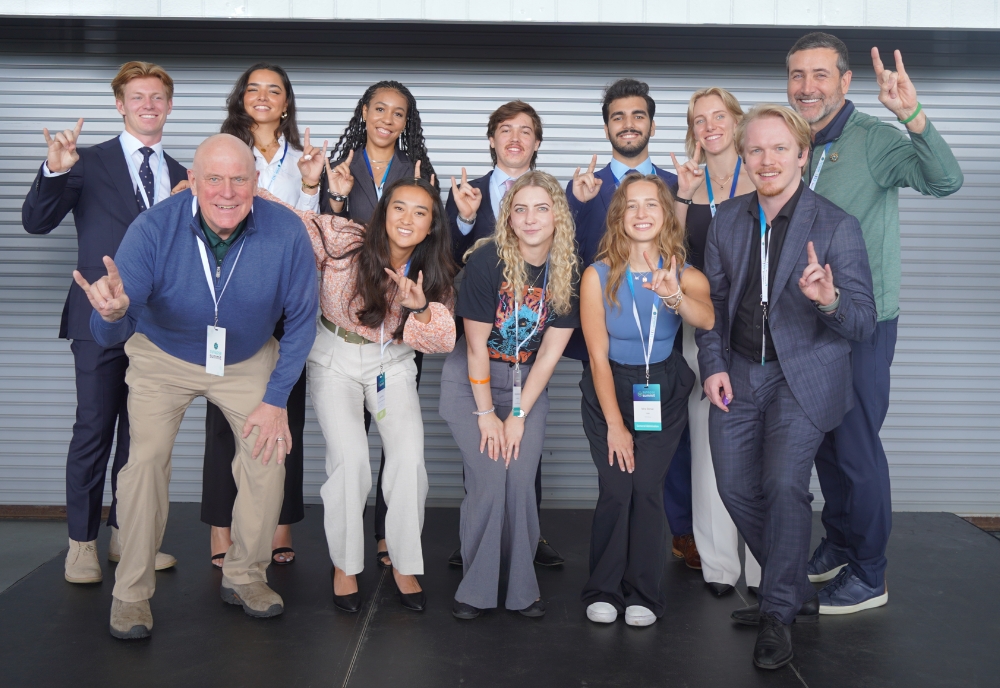TAMPA — The University of South Florida represented at this year’s Synapse Summit, held at Raymond James Stadium, showcasing student ventures, cutting-edge research and expert insight across a range of fast-growing industries. With representatives from the Muma College of Business, College of Engineering, College of Marine Science and other colleges and centers, USF played a key role in highlighting how higher education fuels innovation in the Tampa Bay region.
Synapse Summit is one of Florida’s premier technology and entrepreneurship conferences, celebrating the regional ecosystem through panels, keynotes and exhibitions focused on cybersecurity, sustainability, health, fintech and more.
Muma College of Business
Muma-Wide Activities
Muma College of Business Dean David Blackwell attended the event to support student and faculty presenters, network with attendees and represent USF in the summit’s VIP areas. Muma maintained a booth on the exhibition floor with giveaways and academic program information, located alongside other USF departments.
The college was featured in two key panel sessions:
“Solar Power as a Catalyst for Change: A Story of Innovation and Impact”
Ph.D. student and entrepreneur Freeman Talla shared the story of SOLAccess, his mission-driven
startup providing solar energy to communities in Cameroon. Talla described how tragedy
inspired a vision to improve health care, job creation and entrepreneurship through
renewable energy.
“Bitcoin, Stable Coins and the Future of Finance”
Dr. Shivendu Shivendu, associate professor at Muma, explored how digital assets like
bitcoin and stablecoins are disrupting traditional finance. His talk examined how
these tools influence monetary policy and what their rise means for the future of
decentralized finance (DeFi).
********INSERT PICS HERE********
Nault Center for Entrepreneurship
The Nault Center for Entrepreneurship made a dynamic showing, with multiple panels, student presentations and a booth that provided insight into its academic programs and startup support.
Students presented a range of ventures developed during their time at USF, including:
- Ridely (student carpooling app)
- LOPE (protein-packed energy bars)
- S&B Alpine Tours (travel services)
- Travelers Resorts (hospitality)
- Rush Power (pre-workout gummies)
- SYP Hydration (AI hydration tracker)
- SoleLuxe (custom sneaker accessories)
Key sessions featuring Nault Center speakers included:
“Launchpad for Tomorrow: How Young Innovators Are Building the Future Today – Session
1”
Nault student Rima El Brouzi joined a panel of young entrepreneurs to share how university
programs shaped their ventures, from ideation to launch.
“Unlocking Value: How to Leverage IP for Sustainable Growth and Investment”
Moderated by Tim Ernest, program planner analyst at the Nault Center, this panel explored
intellectual property commercialization. Doug Nissinoff from USF’s Technology Transfer
Office shared insight into licensing, startup funding and tech transfer pathways.
********INSERT PICS HERE********
Fintech Center at the Kate Tiedemann School of Business and Finance
The Fintech Center hosted a booth and was prominently featured in a high-profile keynote:
“Pillar Kickoff Session: The Future of Fintech: Innovation and Positive Impact for
Our Region”
Michael D. Wiemer, the center’s inaugural director, discussed how fintech is transforming
personal banking, digital assets and payments. His talk highlighted regional opportunities
and urged collaboration among investors, startups and policymakers.
USF Research and Innovation
USF CONNECT
USF CONNECT, the university’s business incubator and research support unit, participated with a booth and panelist representation:
“Accelerating the Marine Economy: Tampa Bay's Innovative Accelerator Program”
Director Shannon Pastizzo joined experts in discussing a $13.9 million NOAA grant-backed
program aimed at spurring innovation in marine science and sustainability across the
region.
********INSERT PICS HERE********
College of Engineering
The College of Engineering engaged in exhibits and collaborated with the Nault Center during the Young Innovators Summit.
“Dual-Use Innovations: Bridging Commercial Success and National Security”
Taylor Johnston of the USF Institute of Applied Engineering participated in this panel,
which explored how technologies used in both commercial and defense sectors can attract
venture capital while enhancing national security.
College of Marine Science
The College of Marine Science contributed research expertise to a forward-thinking panel:
“Tech to the Rescue: Innovations in Disaster Planning, Response, & Recovery”
Dr. Chad Lembke, Research Assistant Professor, joined experts to highlight new tools
like drones and AI-powered robots that support emergency response efforts.
Bellini College of Artificial Intelligence, Cybersecurity and Computing
The Bellini College explored the fast-evolving role of AI in national security through a thought-provoking session:
“From Threats to Solutions: How to Harness Generative AI for National Security”
Dr. John Licato addressed the dual-edge nature of generative AI, outlining how it
can be both a security threat and a vital defense tool. His talk offered actionable
strategies for safer AI development.
College of Behavioral and Community Sciences
Department of Criminology
The Department of Criminology contributed new research findings on cybersecurity through a data-driven presentation:
“Empirical Insights Into Malicious Hacker Behavior: Mapping Attack Trajectories for
Cybersecurity Interventions”
Dr. C. Jordan Howell presented the first systematic study of verified hackers, based
on data from 250 survey respondents and 20 in-depth interviews. His findings aim to
close cybersecurity gaps and inform national cyber defense strategies.
USF Health
USF Health and the Center for Advanced Medical Learning and Simulation (CAMLS) were featured in a session that explored the intersection of healthcare and emerging technology:
“Simulating the Future of Healthcare: How Technology and Innovation are Transforming
Medical Training and Delivery”
Dr. Yasuharu Okuda and Dr. Shannon Bailey joined medical industry leaders to showcase
innovations in simulation technology, such as extended reality and surgical modeling,
that are reshaping clinical training and patient outcomes.
